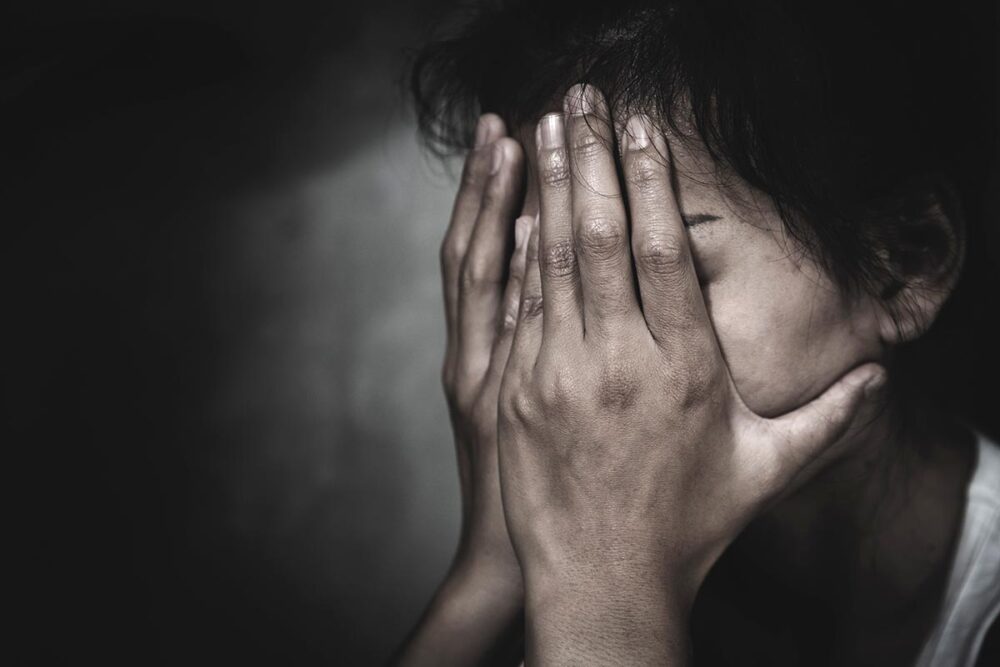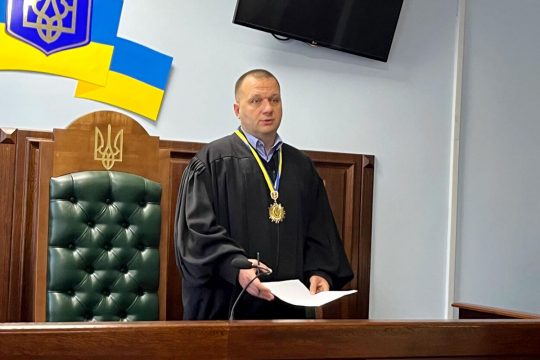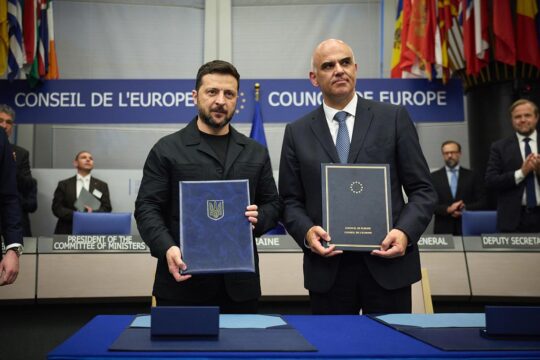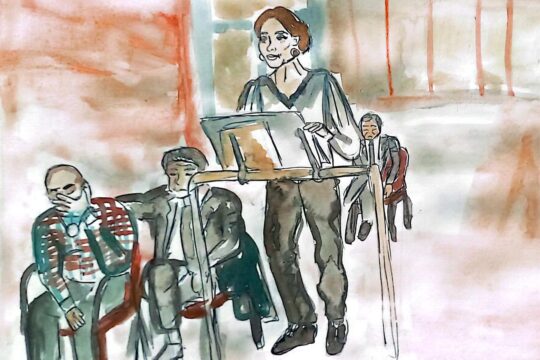Olena Y., a resident of Kamianka-Dniprovska, in the Zaporizhzhia region, southeast of Ukraine, was held captive by the Russian military for six months. In October 2022, while her city was occupied, her neighbours denounced her because her husband was serving in the Armed Forces of Ukraine. The woman told Zlochyn that in captivity she was subjected to torture: she says she was beaten on the head with a glass bottle, strangled with a wire from an electric kettle and submitted to sexual violence.
“In the pre-trial detention centre, sexual violence begins at the doorstep, when people are stripped for the tattoos check, and they are routinely raped in the cells. We were forced to recite the Russian national anthem for hours. They would first beat us with batons right in the cells and in the corridor, then take us to the interrogation room. The police chief threatened me in the cell that he would shoot me in the knees. He shouted at me so hard that saliva was spraying out of his mouth, and his eyes were popping out of their sockets.”
Labour and sexual slavery
The woman spent four months in this detention centre, in the village of Velyka Bilozerka, and two other months in another jail, which were also marked by sexual violence. “There was even more of it,” she recalls.
The fifty-year-old woman, along with seventeen other prisoners, had to dig trenches for the command post on the Russian occupiers’ second line of defence. And not only that: “We would build fortifications, women were forced to do laundry for the soldiers, clean the houses that the officers had seized, and cook.”
As soon as she miraculously managed to return home in March 2023, Olena filed a complaint with the Ukrainian authorities. However, for a long time, she remained silent about the sexual crimes committed against her by the occupiers. She says she was afraid of being not only misunderstood, but even laughed at. Moreover, Olena witnessed first-hand the local Ukrainian policemen’s attitude toward civilian prisoners.
Stigmatisation and victim blaming
“Now, society has a better understanding of the issue of sexual crimes because the war has left its mark. But one of the reasons why I remained silent was the attitude of law enforcement officers on the frontline towards civilians who had been released from captivity. They literally laughed in our faces!”, she says. “And when I made a statement about labour slavery, they sarcastically responded: ‘Would you also like to be given the status of a combatant?’ How was I supposed to talk to them about sexual violence?”
“When I filed a complaint with the police and the three main suspects in the criminal proceedings were identified – the chief of police, the head of the detention centre, and the FSB officer who hit me on the head with a bottle are now facing legal proceedings –, I had just been released and was not ready to talk about these incidents,” Olena continues. “I was in a state of shock and profound depression, which, to be honest, I still experience today.”
Olena’s story is not unique. The attitude towards gender-associated and sexual violence in the Ukrainian society, merely stigmatisation and victim blaming, explains the victims’ unwillingness to talk about these crimes and disclose the details. As a result, criminal prosecution is often difficult to achieve. Reportedly, law enforcement authorities are often reluctant to register complaints and often classify sexual violence under the articles of “misconduct” or “infliction of bodily harm”.
211 women and 118 men
Conflict-related sexual violence (CRSV) is legally defined as a war crime in Ukraine since 2014. However, after the full-scale invasion and the start of the International Criminal Court (ICC) investigation in Ukraine, CRSV, along with all war crimes, is now gaining more attention from the domestic investigators and prosecutors in Ukraine. Between 24 February 2022 and 1 November 2024, 329 cases of conflict-related sexual violence against 118 men and 211 women have been registered by the Prosecutor General’s Office. Among them, 17 of the victims are minors, 16 girls and 1 boy.
In Dnipro, lawyer and human rights activist Yulia Seheda points out that although the website of the Prosecutor General’s Office constantly updates these numbers, the statistics do not reflect the reality, . as these crimes are the most concealed. “People can submit such complaints five or ten years later. Many victims are in the temporarily occupied territories and cannot reveal anything about the crimes they were subjected to. Moreover, it is difficult for victims to talk about these traumatic events. They are reluctant to share the details with anyone. Therefore, we presume that there are significantly more cases than those we are currently aware of and registered by prosecutors,” Seheda says.
The Prosecutor General’s Office indicated that the highest number of cases of CRSV (105) was reported in the Kherson region. There are also 59 cases in the Kyiv region, 77 in Donetsk, 38 in Kharkiv, 22 in Zaporizhzhia, 8 in Chernihiv, 6 in Luhansk, 10 in Mykolaiv, 3 in Sumy, and one in the utonomous Republic of Crimea. These cases include rape, mutilation or violence to genitals, forced nudity, threats and attempts of rape, being forced to watch sexual abuse committed against relatives, etc.
“In every location where the Russian military were deployed”
“After the de-occupation of the territories in the east and south of the country, we can observe a distinct pattern: cases of CRSV have been reported in every location where the Russian military were deployed,” the Prosecutor General’s Office stated in response to our inquiry. “By 1 November 2024, 60 Russian servicemen were served with suspicion notices for crimes committed in the de-occupied villages of Kyiv, Chernihiv, Kherson, Kharkiv and Mykolaiv regions. 28 indictments against 37 individuals were sent to court, 5 offenders were sentenced to imprisonment: three of them to 12 years, two of them to 10 and 11 years, and one sentence against an offender has not yet entered into force. 88 cases of CRSV were solved.”
“Before national courts, this category of cases can be heard in absentia. Therefore, prosecutors are focused on the victim’s interests. A trial is initiated if a person is determined to obtain a court decision, but the priority is to formalise the war crime and collect evidence in accordance with international standards to subsequently use it in international instances to bring the senior officials of the Russian Federation to criminal responsibility,” the Prosecutor General’s Office stated. “As for the profile of the accused, they are servicemen of the Russian Armed Forces, including commanders of the military units,” it added.
After therapy, Olena files a new complaint
During her therapy, Olena met other women who had suffered from CRSV. Afterwards, she filed a complaint for these crimes with the Prosecutor General’s Office. “The prosecutor in charge of the case came to meet me and I told him on camera and in detail about each of the six episodes of violence. Criminal proceedings have been initiated. But they work slowly. I need to undergo an additional forensic examination and psychological and psychiatric evaluation because when I had them the first time, I had not yet filed a complaint about CRSV. The timeframe is very important,” she told us.
However, Olena is convinced that a fair investigation of the alleged war crimes, including those related to CRSV, is mandatory. Also, the issue of reparations is admittedly acute for her. “Why can’t the assets of the Russian Federation be frozen and reparations paid to victims?,” Olena asked. “Due to captivity, I suffered damage to my health. I need rehabilitation and money for it. I was detained on my own territory, in my home. I have been paying taxes all my life. I was fired from my job. I worked as a recordkeeper in a hospital. My employers did not expect me to come back. I had to file a lawsuit to restore my employment, and I receive payment for the period, but they claimed I was voluntarily absent, which is a fiction.”
“We need to talk about CRSV,” Olena said when starting the conversation with the journalist of Zlochyn. “In fact, many of our compatriots have suffered from such crimes, but, in my opinion, 90 per cent remain silent. Victims talk about all the other crimes, but they don’t talk about CRSV. It is especially difficult for men. We need an example and people will speak up.”
This report is part of our coverage of war crimes justice produced in partnership with Ukrainian journalists. A first version of this article was published on the "Zlochyn" website.







